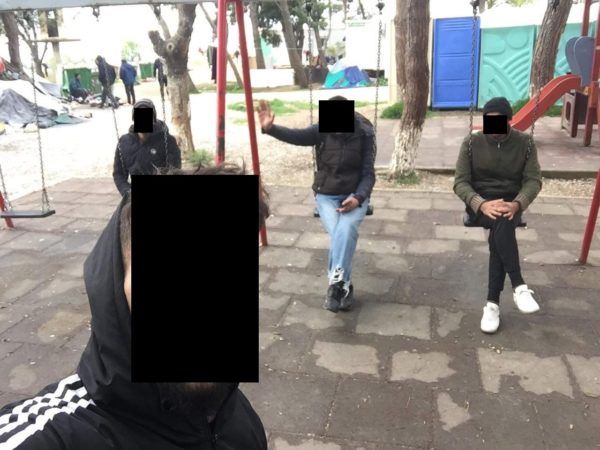Reportedly on the 29th March 2020, 40 people were removed by Greek police from inside Diavata camp (Echedoro 545 00), close to the city of Thessaloniki in Greece. Several persons who were removed gave matching accounts of Greek police officers who entered the camp and approached those specifically who were staying in tents and improvised shelters in the grounds of the site.

One respondent, a man from Tunisia, explained how he was approached in the camp by two police officers (one man and one woman). They allegedly said to him:
“Where is your khartia? How long have you been in Greece?”
“Khartia” is the informal name for a legal document to regularize stay in Greece, and was offered to a number of people staying in the grounds of Diavata camp on the conditions they came with the officers. The respondent was told by the police that he would be taken to a police station for 1-2 days and be issued this document. He was told he would be returned to the camp and that he didn’t need to bring any of his possessions. Another man from Algeria shared the same experience, having been told by officers:
“We are going to do khartia”
He was also denied the chance to collect his possessions and informed he would be back at the camp within two days. Up to 40 persons were loaded into vans in the camp on the basis of receiving a khartia from the police. The people in the group were from a range of countries, including Algeria, Morocco, Tunisia, Palestine, Iraq, Syria, Bangladesh, Afghanistan and Pakistan. The authorities drove them a short distance (approx. 10 minutes) to a police station where they were unloaded and brought inside.
But rather than being processed and issued the aforementioned paper, the 40 persons had their possessions removed (including phones, money, parts of their clothing and shoes). One respondent recalls that people in the group vocalised expression for asylum, but the Greek officers in the station used physical intimidation and hit people who continued to verbalise these requests. The same day, the group was loaded into a large blue bus with “police” written on the side. The people were not informed of the reasons they were detained, nor of their destination.The bus drove for around five hours and delivered them to an unknown detention site.
The group were unloaded at this site at around sunset on the day they were arrested. The respondent from Tunisia stated: “It did not look like a police station” and it was an “old house” in the some trees/unpopulated countryside. Meanwhile another group member stated that the detention space was also close to an abandoned railway station, and was in the area of Alexandroupolis (GRK).
The detention conditions were described as very poor. The respondents recall how they were held for two days in cramped conditions, and without enough food. One suggests they were ordered by officers to share some small amount of bread as the only meal they received. Meanwhile another described the sleeping conditions as 20 beds per room, and that they were one of several rooms within the site. During the two days they were held there, the respondents did not report receiving violence directly to themselves, but state that other people in their group did suffer beatings from Greek authorities.
On the night of 31st March/1st April 2020 at least 20 persons were loaded into vehicles (some into a large bus and some into a smaller van) and driven to the Evros/Meric river. The respondents describe the journey as taking around 15-30 minutes. They were unloaded in the dark next to the river and ordered to strip to their underwear. The Greek authorities used batons and fists to hit some members of the group. After the beating, the transit group were placed in a rubber dingy (small plastic vessel) and transported to the Turkish side of the river.
This occurred in two stages, with around ten people transported each time. The respondents describe the driver of the boat being a masked person that they suspected to be Moroccan who was working with the Greek police. This person steering the boat did not start the motor, allegedly to make “no noise” in order to not alert the Turkish authorities to the pushback. The driver reportedly returned to the Greek bank of the river with the boat after conveying the second group across. As they were pushed back to Turkey the Greek officers shouted at them to continue walking. In this way the total transit group was dispersed into several smaller groups of around 6-7 people, meaning that when the respondent landed on the Turkish side he did not find the group that was ferried before him.
After the pushback, the group approached officers of the Turkish Gendarmerie who were patrolling in the area. They were all taken to a detention facility somewhere nearby and held for three day before being released. The respondents describe fair treatment during this period, having been issued clothes, shoes and food.
